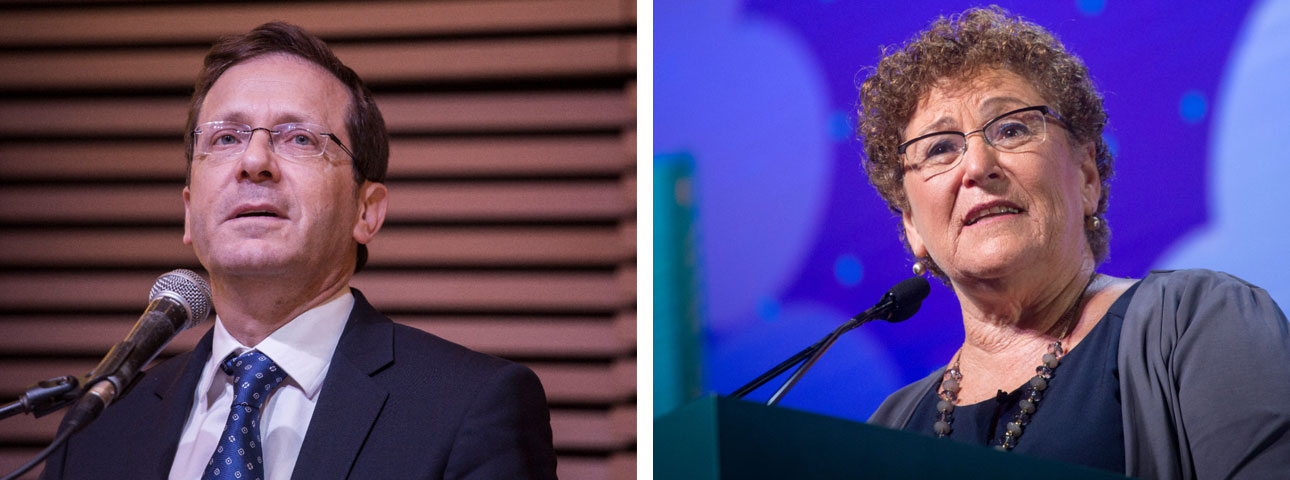The Israeli Presidential Race Begins
The race for the election of the 11th President of Israel has officially begun. After the large number of candidates in the race that took place 7 years ago, this time only two will compete: Yitzhak Herzog and Miriam Peretz. Most of the candidates who have run for the presidency throughout Israel's history have had a political-partisan background; Most of them were men, aged sixty plus.

Of the ten presidents who served, only one lacked a political-partisan background: the fourth president, Ephraim Katzir. This article reviews the background and characteristics (gender, ethnicity and age) of the candidates and the winners in the presidential contests.
The Position is Ceremonial; the Candidates are Political
Although the position of President of Israel is essentially ceremonial, and the president has very limited authority, all Israeli presidents except one came from the political arena. Some see this as inappropriate, inasmuch as the president's role is i to unite people and bring them together. And so, the role of president should rise above day-to-day politics. Ideally, the president should be a figure drawing the broadest consensus possible among the various groups in Israeli society, rather than a figure associated with a political party. . However, since the President of Israel is elected by the 120 members of the Knesset, the selection process is indeed intertwined with party politics, and the race for president sometimes becomes heated and confrontational rather than a process with an aura of respectability. Indeed, past races show that support for a particular candidate was usually dictated by party lines or party coalitions. Nevertheless, since the presidential elections are conducted by secret ballot, in some cases, Knesset members were given the freedom to vote as they desired, and even in cases in which they were not officially given such latitude, there have been times when the vote did not proceed along party lines.
In contrast, some people argue that there is nothing wrong with the fact that presidential candidates in Israel hail from the political arena. After all, it is only natural that the main public arenas—the Knesset and the government—supply the largest pool of presidential candidates. Moreover, history has shown that once a president is in office, he tends to shed his party affiliation and fulfill the role in an impartial manner.
23 individuals competed in presidential elections between the years 1949 and 2014. 17 of them had a political background-- mainly incumbent or former MKs. Only six came from outside the political arena. The first was Joseph Klausner, who ran against Chaim Weizmann in 1948. A historian and literary scholar, Klausner, who was supported by the Herut party, was one of the founders of the Hebrew University of Jerusalem. Two non-political candidates ran against each other in the 1973 election: Prof. Ephraim Katzir, a scientist, was the candidate of the ruling Labor Party, while Prof. Ephraim Elimelech Urbach, a philosopher and scholar of Judaism, was the candidate of Gachal (the Herut-Liberals bloc) and the National Religious Party. Katzir defeated Urbach and was elected president-- the only one of Israel's ten presidents who came from outside of the political arena.
In the 1978 elections, Menachem Begin, who was then prime minister, supported the candidacy of Prof. Yitzhak Shaveh for president. Shaveh, a nuclear physicist, was barely known to the public, and his candidacy for president made many members of the Knesset uneasy, even within the ranks of Likud, until he withdrew from the race three weeks before elections. Five years later, in 1983, Prof. Menachem Elon, a renowned historian, scholar of Jewish Law, and Supreme Court Justice, ran for president as the coalition's candidate. He lost the very close race, which resulted in victory for the opposition candidate, Chaim Herzog. In 2014, two additional non-political candidates competed: former Supreme Court judge Dalia Dorner and Prof. Dan Shechtman, winner of the Nobel prize in chemistry.
It is interesting to note that five of the six non-political candidates were academics. The academic arena, therefore, serves as the second largest pool of candidates for the presidency, after the political arena.
An Old Boys Club of Ashkenazi Men?
An analysis of the demographic characteristics of the 23 presidential candidates and ten Presidents indicates that most of them share the following features: they are men,, Ashkenazi, and over the age of 60. In terms of gender, not only have all ten Presidents of Israel been men e, but only three of the 23 candidates were women.
Only two presidents—Yitzhak Navon and Moshe Katsav—were of Sephardi origins, while the rest were of Ashkenazi origins. If we include presidential candidates in this calculation, we find three more candidate of Sephardi origin: Shaul Amor (1998), Meir Sheetrit and Dalia Itzik (2014). The average age of those actually elected for President is 67; the average age of all candidates is only slightly lower, at 66. Only three Presidents began their presidency before the age of 60: Ephraim Katzir and Yitzhak Navon at 57, and Moshe Katsav at 54. The oldest president was Shimon Peres, 84 years old at the time he was elected.
Israeli Presidents and Presidential Candidates
| Candidates | Presidents | |
| [N=23] | [N=109] | |
| Political background | 17 | 9 |
| No political background | 6 | 1 |
| Age during candidacy / first election | 66 | 67 |
| Male | 20 | 10 |
| Female | 3 | 0 |
| Ashkenazi | 18 | 8 |
| Sephardi | 5 | 2 |
*The Candidates ( in chronological order ): Chaim Weizmann, Joseph Klausner, Yitzhak Ben-Zvi, Yitzhak Greenbaum, Mordechai Nurock, Peretz Bernstein, Zalman Shazar, Ephraim Elimelech Urbach, Ephraim Katzir, Yitzhak Navon, Menachem Elon, Chaim Herzog, Ezer Weizman, Dov Shilansky, Shaul Amor, Shimon Peres, Moshe Katsav, Colette Avital, Reuven Rivlin, Dalia Dorner, Dalia Itzik, Dan Shechtman and Meir Sheetrit.
**The Presidents: Chaim Weizmann, Yitzhak Ben-Zvi, Zalman Shazar, Ephraim Katzir, Yitzhak Navon, Chaim Herzog, Ezer Weizman, Moshe Katsav, Shimon Peres and Reuven Rivlin.
